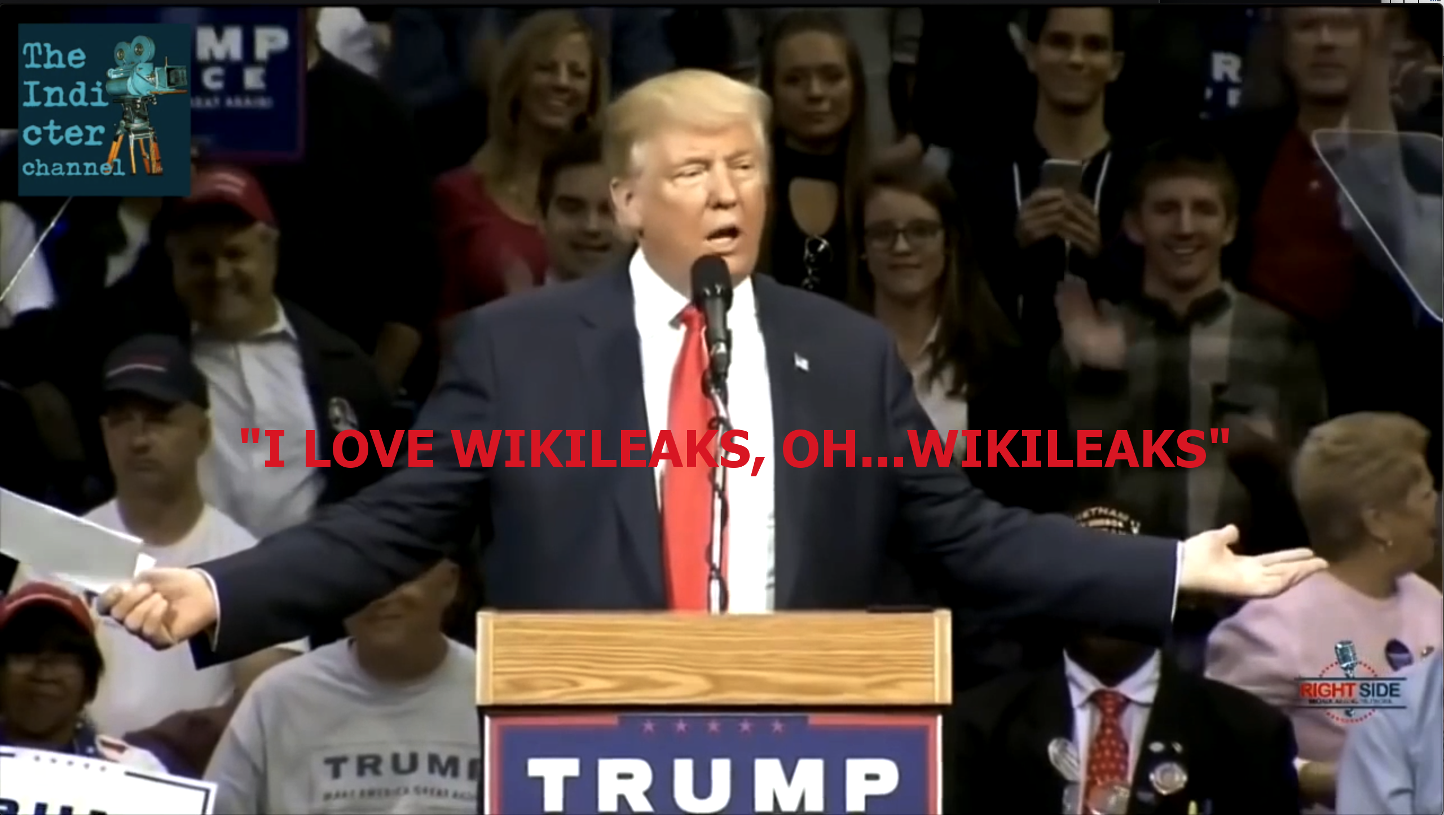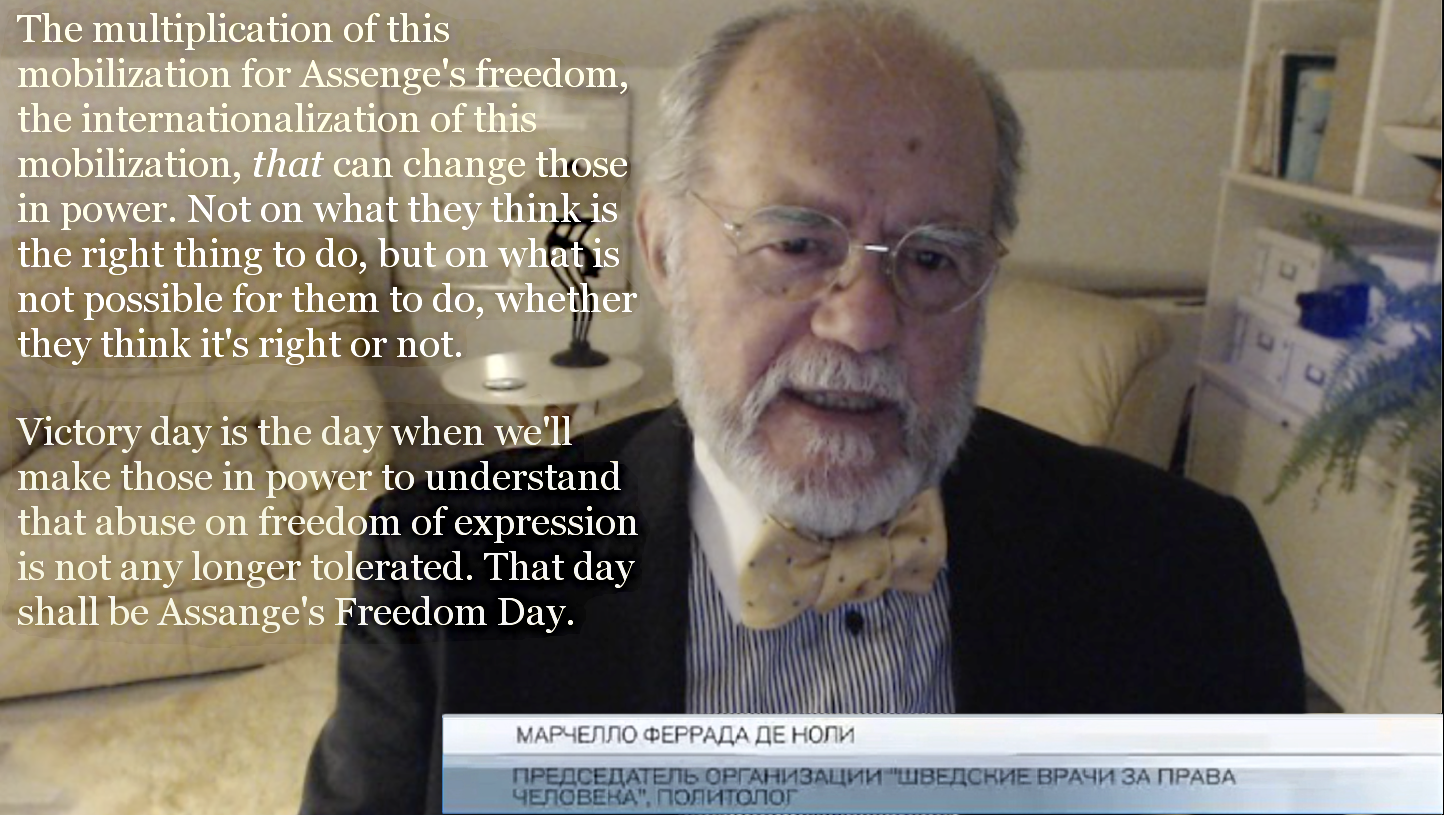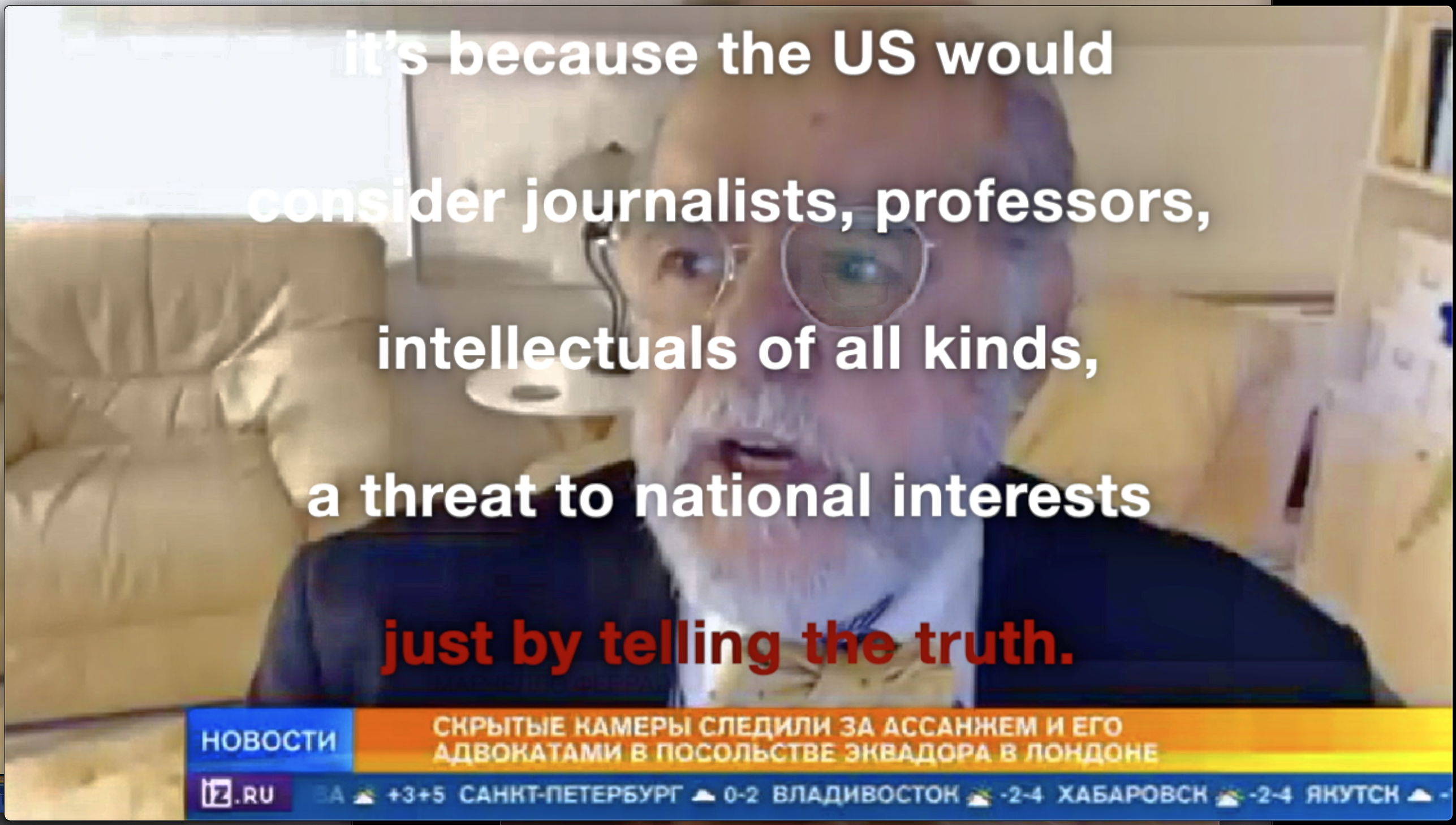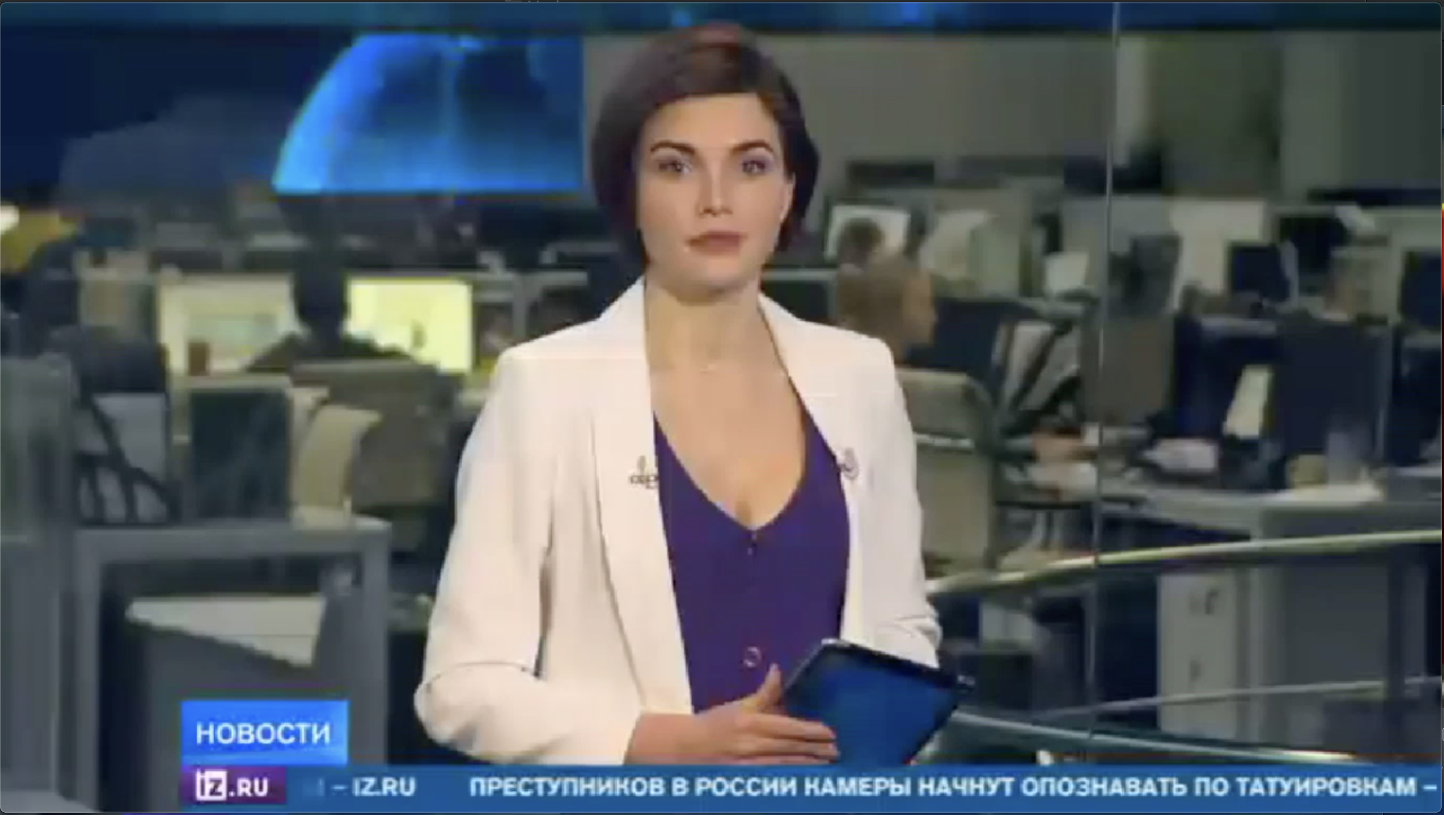Editor’s note: REN TV (Russia) interview with Prof Marcello Ferrada de Noli, The Indicter Magazine chief editor. Interview conducted by Cristina Fedorova. Footage excerpt aired in REN TV news program of 24 February 2020. The text here below corresponds to a direct transcript from the interview’s audio / Dr Lena Oske, Acting Editor, The Indicter Magazine.
REN TV –ABC channels reports on the surveillance of Assange inside the Ecuador’s embassy in London. Do you think it is illegal?
Marcello Ferrada de Noli (MFdN) –Of course it is illegal, and the question is why the US government would pursue such an illegal endeavour –which became very known, particularly after the Edward Snowden revelations about the purpose and scope of this espionage the US has on its own citizens. And this (about Assange) it’s because the US would consider journalists, professors, intellectuals of all kinds, a threat to national interests just by telling the truth.
REN TV –What was the purpose, why that (surveillance) was set up? Who needs to know every step taken by Assange in the embassy? What is the “strategy” here by the US government?
MFdN –The strategy is known here. They have publicised the prosecution points against Assange, they will try to prove that Assange has infringed that very old espionage law in the US. Obviously, they try to gather every tiny piece of information that put together could enable the juridical puzzle they need to fit with their legal hypothesis. The purpose is to tie all those tiny pieces of information to the constructed prosecution case.
REN TV –The fact that cameras are placed in the embassy is Ok. It is about security, and that is well understandable. But to collect such a private information, such as in the toilet for women? I remember Julian Assange saying that the women’s bathroom was the only place considered safe for talking. Is this not a violation of his rights? Or how would you call it otherwise?
MFdN –Well, one thing is that, as you mentioned, there are security measures, provisions, that makes acceptable the installations of those equipments. But another thing, a totally different thing, is if those are diverted to obtain information which is infringing the civil rights of individuals, even worse considering they are publishers or journalists (and lawyers). That is completely another thing.
Secondly, that espionage went on for years. The ABC article you mentioned says that this would have been happening all the way from 2015 until 2018. So those two situations are not comparable. Its comparison is not acceptable.
REN TV –If Assange is extradited to US, what will happen to him. Is that true he will get about two hundred in prison, or what should be wait for?
MFdN –The extradition per se would be feasible, juridically speaking, if the UK government finally authorize it. In that case Julian Assange will be taken to the US, and he will be charged in court, and possibly he would receive that long sentence that you mentioned. But beyond that, the US strategy aims to hit the all whistle-blower movement. These measures, these extreme measures that the US government is using, is to deter future revelations of the kind done by WikiLeaks in regards to the abuse of power, the war crimes in Iraq, the documents on Afghanistan [the Afghan files], etc.
Assange is one thing as an individual, but then you have the societal phenomenon which Assange represents. And there you will find the political or geopolitical strategy which is behind these strong measures that the government of the US is deploying in the case.
REN TV –Could we paraphrase this, “I am Trump, I can do anything, against any country, against any person…I am Trump, I just can”?
MFdN –What Trump would think by himself, or about what he would like to do, that would one thing, and of course he is the US president. On the other hand, the frictions the president has had with members of the Intelligence community are well known. So, who is really leading this persecution and prosecution against Julian Assange? It is not totally clear.
I remember a video uploaded by The Indicter Channel –a channel produced by our organization SWEDHR– where Trump is saying “I love WikiLeaks”, and seemingly felt grateful for the impact of the revelations made by WikiLeaks about that chapter, you know what chapter. Assange has, by the way, emphatically denied, absolutely, that he would have received that information from the part of Russia. I am talking about the “email revelations” during the (presidential) campaign.
 Trump ”loves” Wikileaks. The Indicter Channel
Trump ”loves” Wikileaks. The Indicter Channel
REN TV –Can you tell me about your experience of visiting Assange? You watched the ABC video and of course you see the same room, of course you see the same man, the same walls. And you understand that when you were there, there were also the cameras, the microphones. Right now, looking through those years, what can you say? maybe, what do you feel?
MFdN –When I saw the images published by ABC, with Julian and the visit of his lawyer, I recalled vividly when I was exactly there in that room. After to leave my briefcase at the checking desk, I was guided into the room, to wait for Julian. I was told he would be there in about three or four minutes. So, what I am going to do here while I wait? I thought. So, I got the idea to start to take pictures of the scenario in which we were going to meet.
Then, nearly immediately after I started to take photos, because there are interesting objects in the room, there are pieces of ceramic, photography, etc. –it is a very interesting place– very soon after that it came an officer, and he wanted to inspect my phone. He wanted to see what pictures I had taken, So, I thought, how did he know I was taking pictures? And that, of course, the room was under surveillance. So, he looked at my pictures and he saw that it was…hmm. I don’t what he saw but he deleted the 4 or 5 pictures I had taken. There were pictures of objects and things like that. So it was nothing more than that, and then Julian came and saw it all, and afterwards we did not even comment the thing. We had so many important things to talk about, and in the middle of our analyses Julian got the idea to tape the conversation, which I agreed. So, he even tape recorded main part of our long talk, which lasted over two hours. As I understood, all those materials, personal belongings of Julian, were confiscated.
REN TV –Have you seen the material in The Guardian about Trump says is ready to have mercy on Assange if he says that were no interferences of Russia in the elections? Do you think that is true, or completely fake? And do you think that he has any chance to be free in the US, and nothing about those two hundred years in imprisonment? Possible or impossible. What is your opinion?
MFdN –Well, Trump indeed pardoned some politicians or functionaries that have received sentences in the United States. And the reports say they were –in one way or another– closer to his political views, or to his administration, etc. So, on the fact that Trump would be able to pardon, yes that is true. I believe that. Whether he is going to exercise that possibility in the case of Julian Assange, I think that we will never get to that point. Perhaps never is a too strong word to say, but the possibilities for Assange to be released, or to avoid extradition, it is in the power that the solidarity movement could achieve. It would depend on the actions that the Australian government would finally implement –because of the political pressure within that country. And the pressure from human rights organizations all over the world. So, I don’t believe that the fate of Assange depends on whether Trump would exercise pardon on him or not.
Secondly, I am not so informed about the exact details of the juridical processes, but I would think that the pardon stage is something to be used, or can be used, after a person has been sentenced. And that, in turn, would be the result of a process, a legal process. So, a pardon, in reference to Julian Assange, it would mean that he first is extradited to the US, then processed in the US, and then sentenced, and then, possibly pardoned. But I really, really, hope that we will not get to that point. What we have to try, and in our utmost possibilities, is to stop his extradition to the United States. We have to increase our mobilization.

REN TV –What do you think the Americans want to achieve with all this on Assange. Torturing Assange, I may say. He was placed inside four walls in the embassy. Now he is in a prison cell, in a British prison. He has mental problems, he has other problems with his health. What for? And now we see that all his rooms have been with cameras. Cameras in his prison, cameras in the embassy. It’s the same, absolutely. Why all this torture?
MFdN –As I said in the beginning of our conversation, the aim I to achieve impunity with regards to criticism, with regards to investigations of their actions, that sometimes would tangle into criminality, and others are straightforwardly acts considered war crimes by international law. Like in the case Iraq, for example. You might remember the video Collateral Murder, produced by WikiLeaks, showing the killing of the Reuters journalists, etc. The main aim is trying –as possibly it can be tried– to inhibit, to stop the denunciations done by honest journalists, by organizations such as WikiLeaks, or human rights movements of which Swedish Doctors for Human Rights is part of it.
So, you ask me, why the torture, why are they doing all this against Assange? You might say that it would be an act of revenge, that they are punishing him for what “he did”. But it is not only that. And that is the point that I would like to stress. It is beyond that. There is a strategy here. And the strategy’s aim is to silent that criticism. It is very awful situation, historically considered, and for the most, ethically considered. It is even paradoxical. As understood in the words of Professor Nils Meltzer, who recently said in an interview done by the Swiss publication Republik:
“The powerful can kill without fear of punishment and journalism is transformed into espionage. It is becoming a crime to tell the truth.”
Meltzer explicitly referred to “the lawlessness that the case Assange has developed”. Which reminds me of a personal interviewed with me for some months ago in Bergamo, Italy, by journalist and author Emanuel Roncalli, and published in L’Eco di Bergamo. He asked me like why I was a defender of Julian Assange and Edward Snowden, in a context in which they have revealed diplomatic documents and top secret information about the US and the UK surveillance programs on its citizens. Would I not consider all that illegal, and criminal?
To which I responded that it is the other way around. It is Assange who has denounced deeds committed by those in power in the US, and that are typified by International law as war crimes. Hence it is not us who categorize those acts as such crimes. It is the legislation adopted by the international community. So, international law, ethics, and decency, are on the side of Julian Assange. And so they are on the side of journalists, human rights activists, and doctors, campaigning for Assange’s freedom, for the truth, and campaigning for the ending of wars.
REN TV –A final question. What do you think the results of the hearings starting on Monday will be?
MFdN –It is impossible to predict what will be the outcome. I have previously attended other hearings in London around the Assange case, when it was Sweden’s turn to ask for the extradition of Assange. What I could experience was that in the main, those verdicts and decisions were against Assange, and favouring the Swedish government. I don’t see any reason why that stance would be changed in the case of the US request. The UK is part of the NATO alliance, etc. This is the thing: This is not a juridical case. This is a political case with strong geopolitical implications. And things have to be analysed from that perspective. And the solution should be given from that area, too.
So, what needs to be mobilized, is pressure from politicians, from governments, from human rights organizations, and from the mass movements that gradually have been formed in order to support the just cause of freedom for Julian Assange, which is also the cause for truth.
REN TV –Yes, but why so many hearings in this process? From prison to a hearing, from the hearing back to prison, and so on and so forth. Weeks and months. What for?
MFdN –In the case of long extraditions processes, that it happened when the Swedish case went on, one reason for that protracted process was to allow the investigators in the Virginia sealed indictment against Assange, to complete their material. So, in my believe, a collaboration between these governments– the US, the UK and Sweden– was established. As I said, towards juridically solidify the case against Assange to be presented in the US. The second reason is that the more the case is prolonged over the time, as consequence, the health status of Assange gets poorer and poorer. A system to kill the messenger by “legal” means. And a perfidy, if intending to kill by means of prolonged agony. Protracting the extradition cases has meant prolonging Assange’s suffering, his isolation, worsening his physical and psychological health status.
However, that is also a boomerang. Because, the longer the case stays on panorama, the higher possibilities for the solidarity movement to be further consolidated. Also conveying greater possibilities that awareness about this horrible injustice would reach more politicians and personalities that could do something about the situation.
REN TV –In these protests, when (demonstrators) shout and shout “Free Assange”, Roger Waters sings, and so on. Do you think that is giving any results?
MFdN –Of course it does. And this is what I believe. If you would think that Rogers Waters or any other engaged personality is going by that act to directly change the attitude of those in power in the US or elsewhere, well that perhaps is not the case. Even if they would be impressed, they won’t change their minds because of that.
But the impact of those activities and actuations is instead directed to the public, impact which in its turn can be convert scores of that pubic into social force. And a social force that on its development is acquiring a political consciousness, results naturally in political force. And there you have the source and means for radical or novel solutions, including the formula to end with this monstrous case.
I’ll try to make my point more explicit: The strategy in these kinds of mobilizations is more directed to increase mobilization than to obtain an immediate result with regards to those in power. And then, a bigger mobilization for Assange’s freedom, the multiplication of this mobilization, the internationalization of this mobilization, that can change those in power. Not on what they think is the right thing to do, but on what is not possible for them to do, whether they think it’s right or not.
Victory is the day when we’ll make those in power to understand that abuse on freedom of expression is not any longer tolerated. That day shall be Assange’s Freedom Day.
REN TV –Professor, thank you very much, thank you for your time, and thank you for your comments.
You may also like
-
Global Assange Amnesty Network (GAAN) call upon Amnesty International to declare Julian Assange a Prisoner of Conscience retroactively
-
“Assange was saved by the U.S. presidential race” – But, can he feel safe?
-
Nomination of Julian Assange for Nobel Peace Prize 2023
-
Sweden: Reasons given to enter NATO, a contradiction of terms
-
Assange Loses, High Court Allows US Appeal; Quashes Assange’s Discharge

